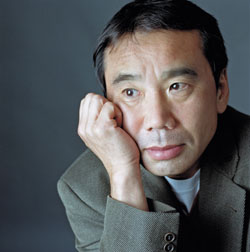I like Haruki Murakami a lot

First off, I do think Murakami is over-rated, but that doesn’t mean he’s not good. I only like two of his books, but I like them immensely: Wind-up bird Chronicle and Kafka on the Shore. His ideas are sometimes corny, but overall I think he’s onto something.
His other books, especially the ones like Norwegian Wood where he goes on about Jazz and girls, I think is stupid—like he’s trying to be F. Scott Fitzgerald, sentimental or even self-satisfied about his lifestyle.
I much more like it when Murakami tries to be Pynchon or Borges. I say ‘tries to be’ because I think Murakami is not original, but he takes existing ideas or methods about/in fiction and his mark is his ability to make it seem like he invented the style. At the same time, he’s not trying to be post-modern the way Delillo tries, or Barth tried. His style is re-appropriation and the audacity to not be ironic about it. He’s an ‘earnest original fraud,’ and I like him a lot.
WUBC starts off with a guy making spaghetti and listening to the radio when the phone rings. I’ve read that part over many, many times and I don’t understand how he did it, but that scene is just as grotesque as Gregor Samsa waking up as a bug. It’s like there’s something ‘wrong’ with the scene. Murakami’s genius is his ability to evoke feelings that are completely uncorrelated with the actual printed words. His novels ‘happen’ outside the words.
KOTS uses alternating chapters to describe two narratives, which is gimmicky I know, but he handles it very well. Near the middle of the book I said, “wait a minute — this is the same story, merely synopated,” that the odd chapters somehow melded into the chasms introduced in the even chapters. It was like entropy: a closed system with two parts, each of which began permeating into the other. I’m usually skeptical about the device of ‘dreams’ in fiction, but KOTS was itself a dream — like the logic was not rational yet made sense, the way we accept random images in our dreams. It lacks Gaddis’s intricacy, but is yet is formally resolved. Murakami, at his best, transcends the formal constraints of time, lineage, narrative, character, etc. His books are dreams that make sense, while not relying on ‘dreams’ to resolve the formal disparities. I can’t describe how he does it, it’s just Murakami.
Whenever I want to be confused and feel like there are Japanese people everywhere, I either go to Japantown or read Murakami. I like him a lot.
